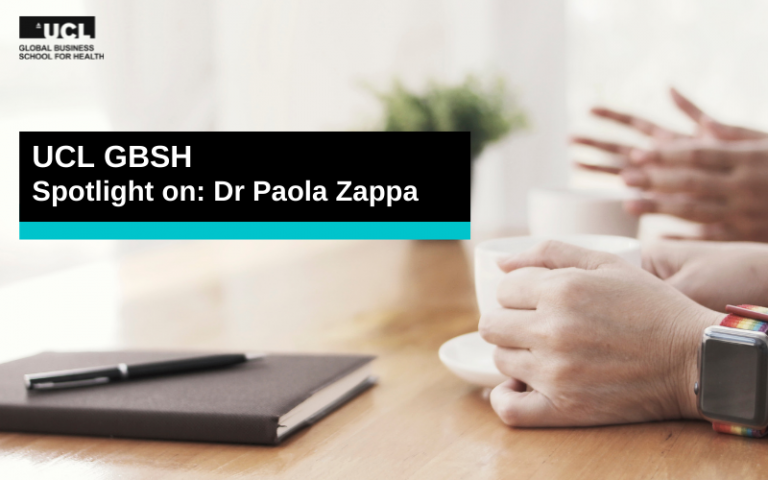Spotlight On: Dr Paola Zappa, Lecturer in Organisational Behaviour & HR Management
20 April 2022
We speak to Dr Paola Zappa, Lecturer in Organisational Behaviour and Human Resource Management at UCL's Global Business School for Health, about her career, academic interests and why she is excited to be joining the UCL GBSH team.

Tell me more about your background – It would be great to find out more about your education and career so far.
I received a PhD in Management from the University of Milan, in Italy. I then held a Postdoctoral position in Micro-organisational theory at the University of Lugano, in Switzerland. Before joining UCL, I worked as an Assistant Professor at the School of Business, Maynooth University (Ireland).
I have extensive teaching experience at both undergraduate and postgraduate levels. At Maynooth University I was also involved in launching various courses in the area of organisational behaviour for master's and PhD students.
I have worked on several research projects aimed at investigating antecedents, dynamics and outcomes of collaboration in hospital settings, with a specific focus on research teams, virtual teams and communities of practice. I have hosted multiple conference tracks and workshops to advance knowledge in these research areas.
Why are you excited to be joining the UCL Global Business School for Health?
The UCL Global Business School for Health (UCL GBSH) has an inspiring vision and compelling purposes, which truly resonate with my view of what academia should be about.
I am excited about the opportunity to join and help train the current and next generation of leaders who will improve and transform healthcare management. I look forward to discussing with them the challenges that healthcare is currently facing – and will be facing in the near future – and the latest advancements in my research area that can help address these challenges.
Of course, I am also intrigued by the interdisciplinary nature of the UCL GBSH as well as the depth and breadth of the research topics it covers. I am delighted by the opportunity to learn from renowned researchers in the GBSH, share ideas with them and – hopefully! – contribute to the UCL GBSH's research outputs.
What are you most excited to teach the first cohort of UCL GBSH students?
Organisational behaviour teaches students about the fundamental role that individuals play in organisational life. Any goals, as ambitious and thought-through as they can be, cannot be truly achieved and organisations cannot thrive unless individuals are placed centre-stage in most organisational processes.
This has been well-known for decades but has been made even more apparent by the recent pandemic. The challenges and transformations that healthcare has gone through in the latest years have emphasized the importance of employees’ well-being (i.e., the evidence of the acute stress experienced by doctors and nurses in the frontline against COVID-19), interest in new work arrangements (i.e., the ongoing discussion about hybrid work and future of work more broadly) and desire for informal interaction and collaboration at the workplace (i.e., from water-cooler chats with colleagues to research networks on shared diagnoses and innovative treatments).
I aim to help students not just critically understand these issues, but also develop a hands-on approach to managing them. I want to convey to students the message that effective people management revolves around investigating individual behaviour from an empirical perspective and letting evidence support leaders’ strategic decisions. Of course, I look forward to equipping students with the theoretical and methodological tools to lead in this way!
Is healthcare management an area more business schools should be exploring? If so, why?
Healthcare management is a key area for business schools for at least two reasons.
First, it is relevant in itself. Healthcare represents a significant portion of the economy in most countries and has a strategic role in their development. It is not by accident that healthcare is explicitly mentioned in the list of the UN Sustainable Development Goals. Therefore, advancing scientific knowledge in healthcare management and preparing future leaders with a specific focus in this area is both timely and needed.
Second, the healthcare industry has traditionally been the context where both researchers and managers have seen the emergence of phenomena that have then become relevant to several industries. For instance, most of the research conducted in my area – i.e., informal collaboration at the workplace – started with an interest in investigating bottom-up innovations in hospitals. Henceforth, improving understanding of healthcare management is a way to advance knowledge in management more broadly.
What contribution do you want to bring to the school and future students?
I want to help students “own” their learning process. Of course, they need to familiarise themselves with different theoretical concepts and lenses. Yet – most importantly - students need to learn how to use these concepts and lenses to solve practical problems, reflect on the implications of their behaviours and decisions at the workplace, become critical thinkers and challenge the status quo.
I also want to contribute to the research agenda of the School, advancing knowledge on the future of health work and the healthcare workforce. My current research interests lie in the dynamics of interpersonal collaboration, knowledge creation and sharing, and their influence on organisational creativity and innovativeness. I plan to expand these interests so to investigate how interpersonal collaboration can be sustained by formal mechanisms, influenced by individual characteristics, attitudes or emotions, and shaped by new technologies.
 Close
Close


